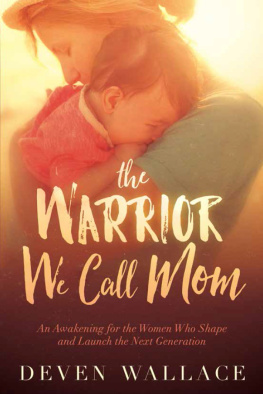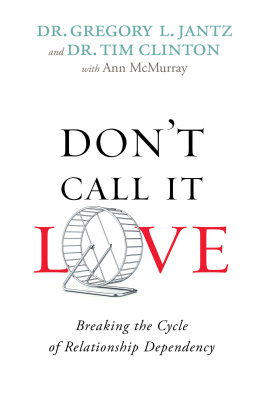Why Not Call That Man?
L etting go of someone you love is one of the most painful feelings human beings can experience. Letting go means suffering and heartache. It means losing love, and love is the highest form of happiness known to mankind.
Letting go of love is the inspiration of much of our present-day culture. Just listen to the top ten songs on the radio. Almost all are about yearning and longing for someone loved and lost: I Cant Live If Living Is Without You, The Way We Were, You Just Keep Me Hanging On.
Most of the jazz ballads sung by the great female singers (Sarah Vaughan, Billie Holiday) are about love and lossMy Man, The Man That Got Away.
Popular movies tell stories of womens inability to let go. Fatal Attraction was about a woman who became a psychotic murderer due to her obsession with a married man who rejected her. Franois Truffauts The Story of Adele H. concerns a woman who went insane after losing a man she was in love with.
Likewise, television and theater are filled with tales of people unable to recover from loss. In the Broadway show Sunset Boulevard , Norma Desmond shoots her lover, Joe, because he is going to leave her. Both daytime and evening soap operas are filled with story lines of people who spend an entire television season pursuing someone whos rejected them. Daytime talk shows have an endless string of obsessed guests who cant let go.
Newspapers are filled with stories of people who cant let go no matter what the cost. Perhaps if Jean Harris had been able to mourn and grieve and work through her rage at Herman Tarnower (Dr. Scarsdale) for betraying her, she wouldnt have killed him in one of the most notorious cases of the 70s.
And if Monica Lewinsky had been able to work through all her feelings about the ending of her relationship with President Clinton with a skilled psychotherapist instead of Linda Tripp, then the course of American history might have taken a completely different turn!
So, how do I know so much about the process of letting go? I went through this experience myself.
A few years ago, I fell in love with a handsome, charismatic, articulate, and mystical man. During our relationship, I became emotionally dependent on him. He taught me much about spirituality. He was loving and supportive. I thought he understood me in a way no one else did. However, when I expressed my desire for more commitment from him, he left.
Looking back, I strongly feel that his sudden and almost cruel rejection was caused by his intimacy problems. When I first met him, he told me he had not had a relationship in more than seven years, and was not looking for a commitment. I fell in love with him anyway, hoping I would be the exception. Despite my professional insight as a psychotherapist, I was still left wounded and devastated. I had to learn the arduous process of letting go so I could recover and move on with my life.
At the same time, I was treating several women who were also having a hard time letting go of relationships that had ended. I decided to start a support/psychotherapy group titled Dont Call That Man! I did workshops in the community and soon found myself on radio and television talk shows as a relationship expert. It seemed this was my path.
From my own personal experience and professional work, I learned how deeply abandonment and rejection in adulthood can wound. The pain of rejection can reach into the very core of ones being. A woman can become so fixated on a man who rejects her that she is consumed by her rage and desire for him. Ive known women to lose their health, money, jobs, childreneven go to jailbecause of their preoccupation with a man who got away. Ive had women come to my support groups and workshops who were on the brink of suicide because of a breakup and their inability to move on.
Women have come a long way financially but still have a lot of work to do to become more emotionally independent. Too many financially self-sufficient women stay in emotionally and physically abusive relationships because they are terrified of letting go. They would rather cling to a man who beats, humiliates, or rejects them than risk the terror of being alone.
In the following chapters, I will teach you to develop the inner resources and skills to let go, so you dont destroy your life for the sake of romantic love and fear of loneliness. The writing exercises will give you a chance to express and experience your feelingsan essential part of the healing process.
This book, the writing exercises, and the Ten-Step Program evolved from my work with the women in workshops and the Dont Call That Man! support/psychotherapy group. Although the majority of the women in the groups and workshops were going through breakups, some were in relationships with unavailable men. These women were looking for the strength and support to leave. Other women felt they were acting too clingy and desperate in their present relationships and wanted more insight into their behavior.
The case scenarios I discuss in this book are based on female patients Ive worked with and people Ive known socially who have struggled with the problem of letting go. All names or identifying characteristics have been changed.
If you are in a relationship and find yourself wanting to call your man too much out of anxiety or panic that he is going to leave or lose interest, then you can use this book as well. Use the writing exercises, The Ten-Step Program, and the information here to work on your own issues so you do not come across as needy and desperate, which can turn off even the healthiest man.
If you are going through a breakup, you can use this book to help your recovery. By following the advice to control yourself to keep from running after your ex, you will recover from the loss with your pride and self-esteem intact. You will not only survive, you will triumph. You may even go on to find a new loveone who will always be there for you.
There really is life after that man!










